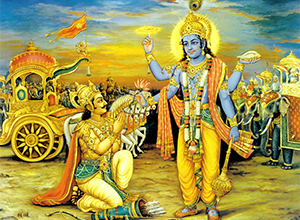Yuganta: The End of an Epoch
Author: Iravati Karve
Genre: Ethics, Literature, Philosophy, Anthropology

All Indians know about Mahabharata, India’s famous epic (at 1.8 million words, also the longest poem ever written, ten times Odyssey and Ulysses).

Beyond the story of a Great War, it is replete with deep philosophical messages, wide ranging human emotions (love, envy, lust, duty) and extensive discussion on the raison d’etre of life. Bhagwad Gita, bible for most Indians, is also part of this epic.
[Iravati maintains the original war story was Jaya, which then kept getting embellished and gained mystical proportions as people took it far and wide]
Mahabharata is also the story of some very complex personalities like Krishna or Bhisma, and can provide deep insights into the human psyche: What was driving them? What were their virtues? What were their failings? However, like all things religious or cultural, we have been brought up to venerate these individuals instead of trying to understand them.
Iravati Karve, the original Indian female rebel (Germany-educated, she was the first woman to ride a scooter in Pune), does a brilliant job in bringing these characters alive, stripping them of their divinity and subjecting them to her razor sharp scrutiny. She questions their motives and behaviour, leaving no subject as a taboo.
 Krishna was a good strategist and friend, often Machiavellian and ruthless, and certainly no God. Read the way Arjuna and Krishna annihilated the Nagas (non Aryans) of the Gandharva forest and you will see the lines of good and bad blurring.
Krishna was a good strategist and friend, often Machiavellian and ruthless, and certainly no God. Read the way Arjuna and Krishna annihilated the Nagas (non Aryans) of the Gandharva forest and you will see the lines of good and bad blurring.
 Draupadi was stubborn and often selfish.
Draupadi was stubborn and often selfish.
 Did Gandhari put the bandage on her eyes out of a sense of marital duty or to shame her husband and his family (she was cheated into marrying him).
Did Gandhari put the bandage on her eyes out of a sense of marital duty or to shame her husband and his family (she was cheated into marrying him).
 Bhisma, since he was convinced he was doing everything for the larger good, ends up doing or at least accepting multiple sins.
Bhisma, since he was convinced he was doing everything for the larger good, ends up doing or at least accepting multiple sins.
The tradition of sleeping with someone else’s wife to create a heir intertwines duty and desire in a complex cocktail of human emotions (most main characters in Mahabharata are born outside the sacred wedlock!).
And that is Mahabharata for you. Real world characters with their real world failings. [Unlike Ramayana which has the ideal hero with his perfectly virtuous wife.]
Why should you read it: To learn how to analyse and understand complex personalities, how to objectively differentiate the good from the bad, how to have a strong personal view even in the face of strong societal opposition and how to write convincingly!
Goodreads Link: Yuganta: The End of an Epoch by Irawati Karve (goodreads.com)

 This information will never be shared with third party
This information will never be shared with third party
Post A Comment
Want to join the discussion?Feel free to contribute!